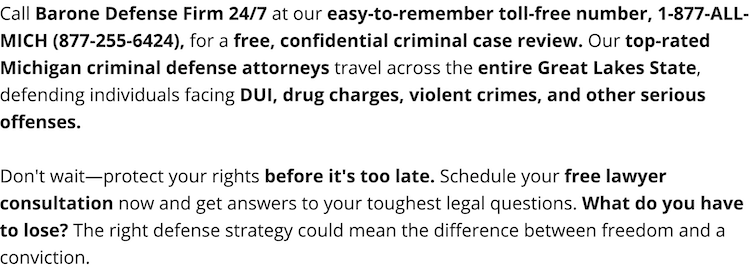Implied Consent Violation Dismissed – License Saved in Southfield Hearing
Charge: Implied Consent Violation
Court: DLAD He aring in Southfield, Hearing Officer Merian
Our client was stopped for speeding, driving the wrong way, and crossing the center line. Thereafter he investigated under suspicion of intoxicated driving. This investigation including administration of field sobriety tests after which our client was arrested for DUI.
What is Michigan’s Implied Consent Law?
Michigan’s DUI laws require a person arrested for DUI to submit to a breath blood or urine test, the purpose of which is to determine how the presence and amount of alcohol or drugs in the person’s body. The law that covers this is the implied consent law.
The theory of implied consent is that by taking a driver’s license you consent to submit to a chemical test any time it is reasonably requested by the police officer. Because this is a search subject to the Fourth Amendment protections, before the search may take place you must be offered the opportunity to withdraw that consent.
At every implied consent hearing there are four and only four possible issues. These include (1) whether the officer was reasonable in believing that you were DUI, (2) whether you were arrested for DUI, (3) whether the chemical test rights were read to you, and (4) whether you unreasonably refused. It is the police officer’s burden of proof. Because this is a civil violation, the burden or proof is only preponderance.
Conduct of the Implied Consent Hearing
In this case, upon learning that our client was being charged with an alleged implied consent violation we immediately filed an appeal of the implied consent charge. The appeal must be filed within 14 days. Missing this 14-day deadline means losing your license for a year. Once the appeal is successfully filed, the case is set for an implied consent hearing. These matters are heard before an Administrative Law Judge, also called a “Hearing Officer.”
At the hearing, the arresting police officer testified about why he stopped our client’s car, and the details of his DUI investigation. The officer also testified that he offered our client a breath test, which the client refused. He did not specifically indicate whether he read our client his implied consent rights. As you can see from above, this is one of the four things the officer must prove in order to win.
Why the Police Lost Their Case
Because the police officer has the burden of proof, failing to make this simple statement about reading the chemical test rights can result in a failure to meet the burden of proof. Accordingly, we argued that because the officer did not provide any evidence that our client was read his rights, he did not meet the required burden of proof. The Hearing Officer accepted our argument and found in favor of our client.
If you’ve been charged with implied consent and can’t remember if the implied consent rights were read to you, then follow this link to review a DI-93, the form used by the police when processing a Michigan DUI. This form sets forth the implied consent rights, and might refresh your memory, or cause you to be firm in your belief that these rights were not read to you.
Benefit to the Client
Because the implied consent law is civil in nature, losing an implied consent case cannot result in incarceration. The penalties are points and driver license sanctions. If you lose an implied consent case, 6 points will be added to your driving record, and if it is your first implied consent violation, your license will be suspended for one year. In this case however:
 Barone Defense Firm Home
Barone Defense Firm Home
















